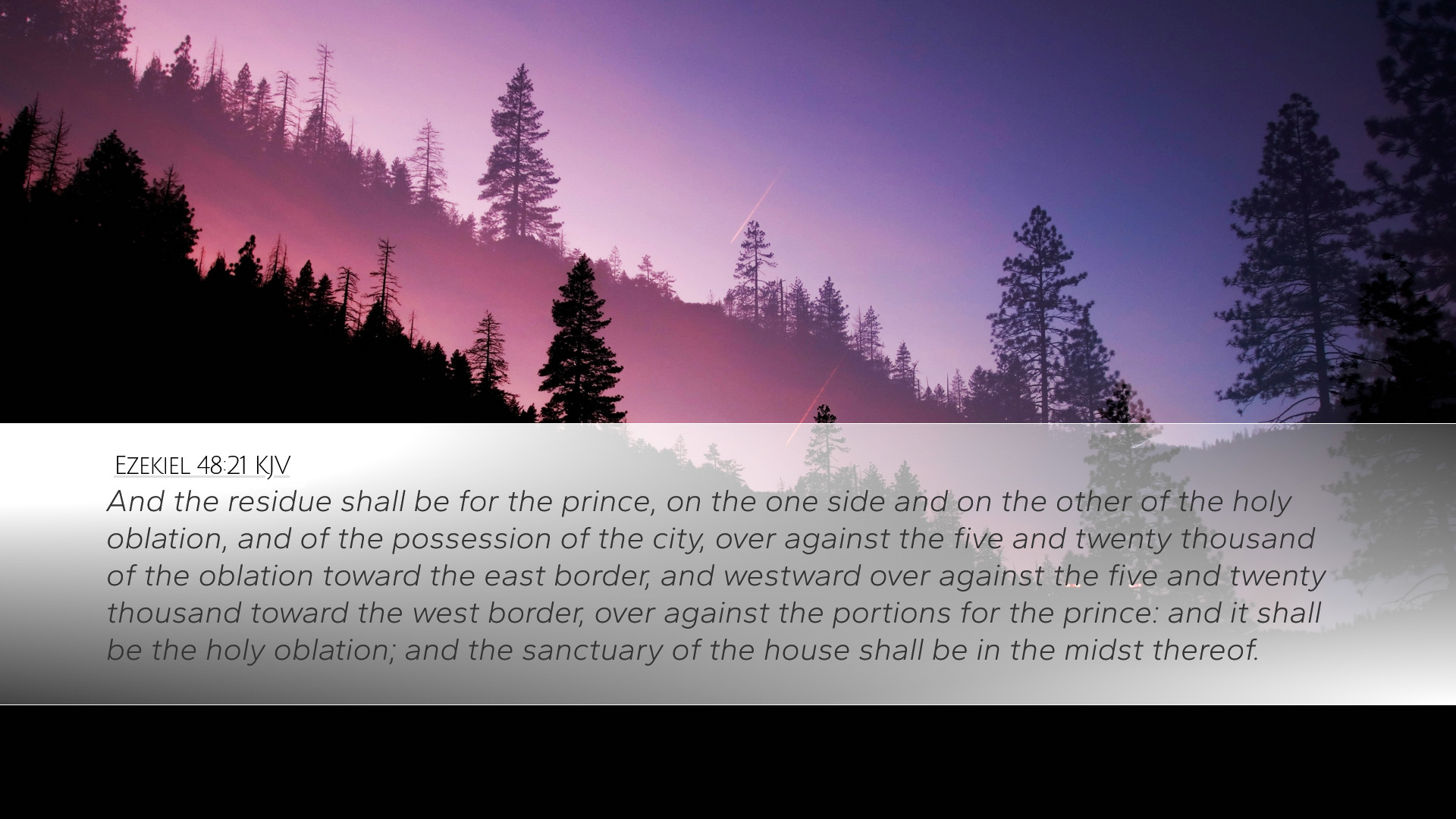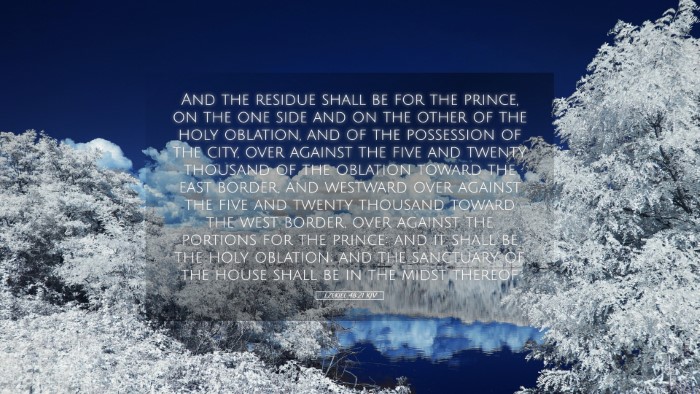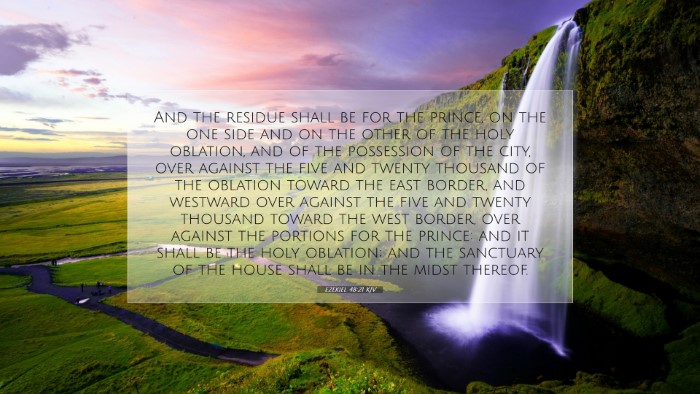Commentary on Ezekiel 48:21
Ezekiel 48:21 states, "The residue shall be for the prince, on the one side and on the other of the holy oblation, and of the city’s possession, over against the five and twenty thousand of the oblation toward the east border, and westward over against the five and twenty thousand toward the west border, over against the portions for the prince: and it shall be the holy oblation, and the sanctuary of the house shall be in the midst thereof." This verse concludes the detailed descriptions of the land allotment for the tribes of Israel and highlights the unique position of the prince in the distributive scheme.
Exegesis and Context
Ezekiel, as a prophetic voice during and after the Babylonian exile, presents a vision of restoration for Israel. The final chapters of the book focus heavily on the prophetic revelation of a restored temple and a renewed Israel. Understanding the context is vital; the Israelites, having been exiled, were being reassured of God's covenant promises. The distribution of land in Ezekiel's vision reflects God's intention to re-establish order and communal living in the holy land.
Key Themes
- Restoration: The theme of restoration is paramount in Ezekiel’s prophecy, culminating in the establishment of a new order where God’s presence dwells among His people.
- Leadership: The mention of the prince emphasizes the essential role of godly leadership in the community, guiding and maintaining the spiritual and cultural integrity of the nation.
- Divine Order: The structured allotment of land not only signifies material possession but also divine order, illustrating how God reigns over His people and His land.
Insights from Public Domain Commentaries
Matthew Henry’s Commentary
Henry underscores the significance of the prince who is described as one appointed by God. He suggests that the prince represents a ruling authority, tasked with preserving justice and order among the people. Henry notes that this prince's role is distinct yet interconnected with the general populace, showing that God provides for both leadership and community. The verse reflects the balance between authority and service—a theme prevalent throughout Scripture, emphasizing that godly leaders are to act in the best interest of their people.
Albert Barnes’ Notes
Barnes elaborates on the specific distribution outlined in this passage, noting it reveals both an equality and abundance within God's provision. He draws attention to how the land is allotted to ensure a share for the prince, indicating a principle of sharing and stewardship rather than exclusive ownership. This perspective reinforces the Biblical understanding that all possessions belong to God, and leaders have a sacred duty to administer them justly. Barnes also highlights the locations given to the prince, signifying both proximity to the sanctuary and responsibility toward the sacred space that can be interpreted as holding the people accountable to God.
Adam Clarke’s Commentary
Clarke brings a rich analysis of the measurements and geographic implications of the “holy oblation.” He discusses the precise dimensions designated within the prophetic vision and how they showcase God's meticulous nature concerning His covenant with Israel. Clarke hints at an allegorical interpretation, suggesting that the land represents spiritual truths about the inheritance believers have in Christ. He emphasizes how the inclusion of the prince in this spiritual inheritance denotes the royal priesthood of all believers, intertwining leadership and communal identity in spiritual matters.
Theological Implications
Ezekiel 48:21 presents several theological implications critical for understanding God’s relationship with His people. Firstly, the provision made for the prince symbolizes God's care for leadership and the expectation that leaders must embody His values. Secondly, the structuring of land reflects God's ownership over creation and the call for stewardship. Lastly, this passage invites deeper reflection on the communal aspect of faith, where God’s intentions for Israel extend to the broader narrative of His redemptive plan for humanity.
Applications for Ministry
- Leadership Development: This verse encourages pastors and church leaders to cultivate a community where leadership is rooted in servanthood and accountability to God.
- Community Stewardship: It prompts churches to reflect on how they manage resources and support one another, echoing the Biblical principle that everything is ultimately God's.
- Hope in Restoration: For those serving in ministry, this passage reinforces the message of hope, inviting congregations to anticipate God's continued work in their lives, leading them to spiritual renewal and restoration.
Conclusion
In conclusion, Ezekiel 48:21 encapsulates profound truths about God's covenant, the nature of leadership, the call for stewardship, and the hope of restoration. The comments from Matthew Henry, Albert Barnes, and Adam Clarke enrich our understanding by bridging historical context and contemporary application. As believers engage with this text, they are reminded of their collective identity in Christ, their roles as stewards of God's grace, and their hope in His restorative work.


